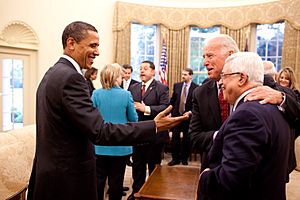Mahmoud Abbas facts for kids
Quick facts for kids
|
|
|---|---|
|
|
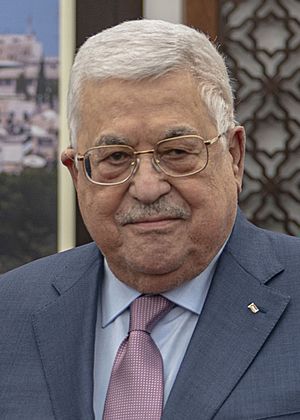
Abbas in 2022
|
|
| 2nd President of the Palestinian National Authority | |
| Assumed office 15 January 2005 |
|
| Prime Minister |
|
| Preceded by |
|
| 2nd President of the State of Palestine | |
| Assumed office 8 May 2005 |
|
| Preceded by | Yasser Arafat |
| 4th Chairman of the Palestine Liberation Organization | |
| Assumed office 29 October 2004 |
|
| Preceded by | Yasser Arafat |
| Prime Minister of the Palestinian National Authority | |
| In office 19 March 2003 – 6 September 2003 |
|
| President | Yasser Arafat |
| Preceded by | Position established |
| Succeeded by | Ahmed Qurei |
| Personal details | |
| Born | 15 November 1935 Safed, Mandatory Palestine |
| Nationality | Palestinian |
| Political party | Fatah |
| Spouse | Amina Abbas |
| Children | 3, including Yasser |
| Residences | Ramallah, West Bank |
| Alma mater |
|
Mahmoud Abbas (born 15 November 1935), also known as Abu Mazen, is a very important leader for the Palestinian people. He is the current president of the State of Palestine and the Palestinian National Authority (PNA).
He has been the leader of the Palestine Liberation Organization (PLO) since 2004. He became president of the PNA in January 2005 and president of the State of Palestine in May 2005. Abbas is also a member of the Fatah political party.
Before becoming president, Abbas served as the first prime minister of the Palestinian Authority from March to September 2003. He also led the PLO's efforts in negotiations.
Contents
Early Life and Family
Mahmoud Abbas was born on 15 November 1935 in Safed. This area was part of Mandatory Palestine, which is now Israel. His family had to leave their home and move to Syria during the 1948 Palestine war.
Abbas studied law at the University of Damascus before moving to Egypt. Later, he continued his studies in Moscow, Russia, at the Patrice Lumumba University. There, he earned a degree similar to a PhD.
He is married to Amina Abbas. They had three sons. Their oldest son, Mazen, passed away in 2002. The name "Abu Mazen" means "father of Mazen." Their second son, Yasser Abbas, is a businessman. Their youngest son is Tareq. Abbas has eight grandchildren. Six of his grandchildren are part of the Seeds of Peace program. This program helps young Israelis and Palestinians connect.
Political Journey
In the mid-1950s, Abbas became very active in Palestinian politics. He joined other Palestinians living outside their homeland in Qatar. There, he worked as a Director of Personnel.
In 1961, he became a member of Fatah. This political group was started by Yasser Arafat and others in Kuwait. Abbas was one of the first Fatah members to suggest talking with Israelis. He believed that even though they had fought, they could also make peace.
Abbas took on important diplomatic roles. He helped to improve relations between the PLO and other countries. He was the person who signed the Oslo I Accord for the PLO in 1993. This was an important agreement aimed at peace. He also wrote a book about his experiences called Through Secret Channels: The Road to Oslo.
In 1995, he worked with an Israeli negotiator, Yossi Beilin. Together, they wrote the Beilin–Abu Mazen agreement. This was a plan for a future peace deal between Israelis and Palestinians.
Becoming Prime Minister
By 2003, Israel and the United States wanted a new Palestinian leader to talk with. They would not negotiate with Yasser Arafat. Mahmoud Abbas was seen as a good choice because he was a founding member of Fatah. He was also known for being practical and open to discussion.
Under pressure from other countries, Arafat appointed Abbas as Prime Minister of the Palestinian National Authority on 19 March 2003. During his time as prime minister, Abbas faced challenges. He had disagreements with Arafat over how power should be shared.
Abbas also had conflicts with Palestinian groups like Hamas. He wanted to avoid a civil war and tried to negotiate with them. However, violence continued, and Abbas resigned as prime minister on 6 September 2003. He said he did not have enough support from Israel, the United States, or from within his own government.
Presidential Election in 2005
After Yasser Arafat passed away, Abbas was seen as the likely next leader. On 25 November 2004, Fatah chose him as their candidate for the presidential election. This election was set for 9 January 2005.
Abbas called for an end to violence and a return to peaceful ways. He won the election with 62% of the votes. He became the President of the Palestinian National Authority. In his speech, he dedicated his victory to Yasser Arafat and to the Palestinian people. He also asked Palestinian groups to stop using weapons against Israelis.
Leading as President
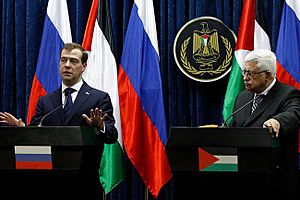
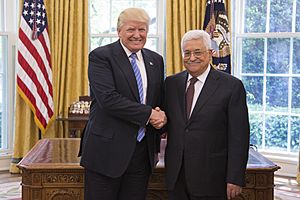
Abbas officially became President on 15 January 2005, in Ramallah. Even after his election, some militant groups continued attacks. This challenged his authority.
On 8 February 2005, Abbas met with Israeli Prime Minister Ariel Sharon. They met at a summit to end the Second Intifada, a period of conflict. Both leaders agreed to work towards peace. Sharon also agreed to release some Palestinian prisoners and withdraw from certain West Bank towns.
Abbas set legislative elections for January 2006. These elections resulted in Hamas winning many seats. Abbas's term as president was supposed to end in January 2009. However, due to political conflicts and divisions, new elections could not be held. So, Abbas has remained president since then.
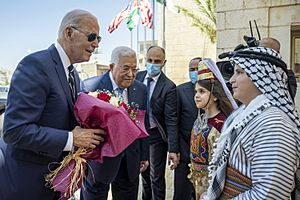
In 2021, local elections were held in Palestine. This happened after Abbas had postponed the presidential and parliamentary elections. During the 2023 Israel–Hamas war, Abbas called for the release of civilians and prisoners. He also expressed concern about the situation in the Gaza Strip.
Political Relationships
With Israel
On 23 January 2005, Abbas helped arrange a thirty-day ceasefire with some Palestinian groups. He took action when attacks continued during the ceasefire.
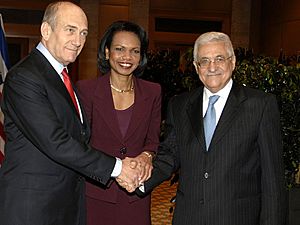
In July 2005, Abbas moved his office to Gaza. This was to help coordinate the Israeli withdrawal from the area.
In March 2008, Abbas said he was pausing peace talks with Israel. This was because Israel continued military operations against militants.
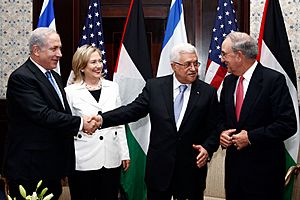
Abbas has said he turned down an Israeli offer for a Palestinian state. He wanted the borders to be based on the 1967 lines.
In 2012, Abbas suggested accepting a two-state solution. This would mean Palestine existing within the 1967 borders with East Jerusalem as its capital.
With Hamas
On 25 May 2006, Abbas gave Hamas a deadline to accept the 1967 ceasefire lines. In December 2006, he called for new elections to resolve political disagreements between Fatah and Hamas.
In March 2007, a unity government was formed with members from both Hamas and Fatah. However, in June 2007, Abbas dissolved this government. He appointed Salam Fayyad as prime minister. This happened after Hamas forces took control of some areas in Gaza. Because of this, Hamas continued to operate in Gaza, and many Palestinians still recognize their prime minister there.
In June 2007, the European Union and the United States decided to restart aid to the Palestinian Authority. This was to support Abbas's government in the West Bank.
With Other World Leaders
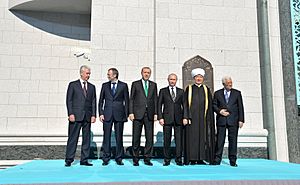
In May 2009, Abbas welcomed Pope Benedict XVI to the West Bank. The Pope supported Abbas's goal of a Palestinian State. Abbas also visited Canada, Venezuela, and Japan. In Japan, he visited Hiroshima and spoke about the suffering there, comparing it to the suffering of Palestinians.
In January 2019, Abbas became the chairman of the United Nations' Group of 77. This group is a coalition of 134 developing nations and China. Palestine is a non-member observer state at the UN.
Images for kids
-
Abbas with Ariel Sharon and George W. Bush in Aqaba, Jordan, 4 June 2003
See also
 In Spanish: Mahmud Abás para niños
In Spanish: Mahmud Abás para niños
 | Sharif Bey |
 | Hale Woodruff |
 | Richmond Barthé |
 | Purvis Young |


